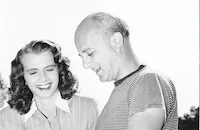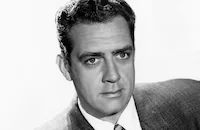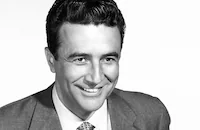The Magic Carpet
Brief Synopsis
Cast & Crew
Lew Landers
Lucille Ball
John Agar
Patricia Medina
George Tobias
Raymond Burr
Film Details
Technical Specs

Synopsis
In an Arabian province, Caliph Omar and his wife Queen Yasmina prepare to announce formally their infant son as successor when Omar is brutally murdered by high court usurper Ali. His cohort, vizier Boreg, chases Yasmina and the baby, but the queen places her son on a magic carpet and, along with a locket carrying the family's royal emblem, sends him to her uncle Ahkmid, before she too is slain. Ahkmid, a physician, places the carpet and locket in hiding and rears the infant, named Ramoth, as his son. Ali, meanwhile, proclaims himself Caliph and with sister Narah and Boreg, begins a harsh reign, draining money and food from the people. Unaware of his royal lineage, Ramoth takes up Ahkmid's trade, while secretly assuming the identity of the red robed Scarlet Falcon, who, with his friend Razi, struggles against Ali's tyranny. When Ramoth, Razi and the Falcon's men prepare to intercept a weapons shipment from Damascus, Razi's impetuous sister Lida demands to go along. The shipment turns out to be a trap, and during the ensuring assault, Ramoth saves Lida's life. Knowing that the only way to discover information about the arms shipment will be from inside the royal palace, Ramoth doses Ali's wine with a mild herb that causes the Caliph to require medical attention. Pleased at being cured, and at Narah's urging, Ali appoints Ramoth court physician. Once Ramoth settles at court, Narah flirts openly with him and implores him to give her some token of his affection. She asks for his locket and when Ramoth refuses, tears it from his neck. When Ramoth firmly rejects Narah's attentions, she hurls the locket away in frustration, and it is later retrieved by Boreg. Recognizing it as Omar's family locket, Boreg visits Ahkmid, who admits Ramoth remains unaware of his parentage. Boreg then knifes the old man when he refuses to divulge the location of the magic carpet. Ramoth discovers the dying Ahkmid, who tells him about his royal blood and the magic carpet. Ramoth tries out the carpet successfully, then informs Razi and Lida of his plan to dethrone Ali. Later at the palace, Ramoth discovers that a message regarding the arms shipment will be sent to Damascus by courier pigeon. Intercepting the pigeon on the magic carpet, Ramoth reads the message and sends Razi and Lida the information. That evening at the palace, Boreg pays an assassin to kill Ramoth, which is witnessed by Narah's attendant, Maras, who reports to Narah. Ramoth evades the assassin and when Narah warns Boreg to stay away from Ramoth, he tells her of Ramoth's true identity. Meanwhile, Riza and Lida receive word that one of their cohorts has been arrested and is being tortured to reveal the identity of the Scarlet Falcon. In order to warn Ramoth, Lida takes the place of a famed dancer scheduled to perform for Ali the following evening. As she dances, Ramoth fails to recognize Lida, however, until she insults Narah and is placed in a dungeon. There Ramoth attends her and she warns him that he is under suspicion. At the same time, Narah breaks into Ramoth's room and discovers his red Falcon's robes. When Ramoth confronts Narah, believing she murdered Ahkmid, she names Boreg as the killer before summoning the guards, who quickly subdue Ramoth. Narah then presents Ramoth to Ali as the Scarlet Falcon and his execution is quickly arranged. Lida, meanwhile, escapes from her cell and, retrieving the magic carpet from Ramoth's room, sends it to his rescue. The carpet carries Ramoth to Razi and his men, who await the weapons caravan. The Caliph's men pursue them, but Ramoth scatters them by dropping pepper on them from the carpet. Once the Falcon and his men intercept the weapons caravan, they storm the Caliph's castle. Ramoth kills Boreg and frees Lida, and as the castle is overrun, Ali also falls. Declaring himself the legitimate Caliph, Ramoth imprisons Narah and proposes to Lida and the couple fly over their domain on the magic carpet.

Director

Lew Landers
Cast

Lucille Ball

John Agar
Patricia Medina

George Tobias

Raymond Burr

Gregory Gay

Rick Vallin
Jo Gilbert
William Fawcett
Doretta Johnson
Linda Williams
Perry Sheehan
Eilean Howe
Minka Zorka
Winona Smith
Crew
Mischa Bakaleinikoff
Edwin Bryant
Ellis W. Carter
Sidney Clifford
Jack Erickson
Sam Katzman
Herbert Leonard
Jean Louis
David Mathews
Wilbur Mcgaugh
Paul Palmentola
Josh Westmoreland

Film Details
Technical Specs

Articles
TCM Remembers - John Agar
Popular b-movie actor John Agar died April 7th at the age of 81. Agar is probably best known as the actor that married Shirley Temple in 1945 but he also appeared alongside John Wayne in several films. Agar soon became a fixture in such films as Tarantula (1955) and The Mole People (1956) and was a cult favorite ever since, something he took in good spirits and seemed to enjoy. In 1972, for instance, the fan magazine Famous Monsters of Filmland mistakenly ran his obituary, a piece that Agar would later happily autograph.
Agar was born January 31, 1921 in Chicago. He had been a sergeant in the Army Air Corps working as a physical trainer when he was hired in 1945 to escort 16-year-old Shirley Temple to a Hollywood party. Agar apparently knew Temple earlier since his sister was a classmate of Temple's. Despite the objections of Temple's mother the two became a couple and were married shortly after. Temple's producer David Selznick asked Agar if he wanted to act but he reportedly replied that one actor in the family was enough. Nevertheless, Selznick paid for acting lessons and signed Agar to a contract.
Agar's first film was the John Ford-directed Fort Apache (1948) also starring Temple. Agar and Temple also both appeared in Adventure in Baltimore (1949) and had a daughter in 1948 but were divorced the following year. Agar married again in 1951 which lasted until his wife's death in 2000. Agar worked in a string of Westerns and war films such as Sands of Iwo Jima (1949), Breakthrough (1950) and She Wore a Yellow Ribbon (1949). Later when pressed for money he began making the films that would establish his reputation beyond the gossip columns: Revenge of the Creature (1955), The Brain from Planet Arous (1957), Invisible Invaders (1959) and the mind-boggling Zontar, the Thing from Venus (1966). The roles became progressively smaller so Agar sold insurance and real estate on the side. When he appeared in the 1988 film Miracle Mile his dialogue supposedly included obscenities which Agar had always refused to use. He showed the director a way to do the scene without that language and that's how it was filmed.
By Lang Thompson
DUDLEY MOORE, 1935-2002
Award-winning actor, comedian and musician Dudley Moore died on March 27th at the age of 66. Moore first gained notice in his native England for ground-breaking stage and TV comedy before later building a Hollywood career. Like many of his peers, he had an amiable, open appeal that was balanced against a sharply satiric edge. Moore could play the confused innocent as well as the crafty schemer and tended to command attention wherever he appeared. Among his four marriages were two actresses: Tuesday Weld and Suzy Kendall.
Moore was born April 19, 1935 in London. As a child, he had a club foot later corrected by years of surgery that often left him recuperating in the hospital alongside critically wounded soldiers. Moore attended Oxford where he earned a degree in musical composition and met future collaborators Peter Cook, Jonathan Miller and Alan Bennett. The four formed the landmark comedy ensemble Beyond the Fringe. Though often merely labelled as a precursor to Monty Python's Flying Circus, Beyond the Fringe was instrumental in the marriage of the piercing, highly educated sense of humor cultivated by Oxbridge graduates to the modern mass media. In this case it was the revue stage and television where Beyond the Fringe first assaulted the astonished minds of Britons. Moore supplied the music and such songs as "The Sadder and Wiser Beaver," "Man Bites God" and "One Leg Too Few." (You can pick up a CD set with much of the stage show. Unfortunately for future historians the BBC commonly erased tapes at this period - why? - so many of the TV episodes are apparently gone forever.)
Moore's first feature film was the 1966 farce The Wrong Box (a Robert Louis Stevenson adaptation) but it was his collaboration with Peter Cook on Bedazzled (1967) that's endured. Unlike its tepid 2000 remake, the original Bedazzled is a wolverine-tough satire of mid-60s culture that hasn't aged a bit: viewers are still as likely to be appalled and entertained at the same time. Moore not only co-wrote the story with Cook but composed the score. Moore appeared in a few more films until starring in 10 (1979). Written and directed by Blake Edwards, this amiable comedy featured Moore (a last-minute replacement for George Segal) caught in a middle-aged crisis and proved popular with both audiences and critics. Moore's career took another turn when his role as a wealthy alcoholic who falls for the proverbial shop girl in Arthur (1981) snagged him an Oscar nomination as Best Actor and a Golden Globe win.
However Moore was never able to build on these successes. He starred in a passable remake of Preston Sturges' Unfaithfully Yours (1984), did another Blake Edwards romantic comedy of moderate interest called Micki + Maude (1984, also a Golden Globe winner for Moore), a misfired sequel to Arthur in 1988 and a few other little-seen films. The highlight of this period must certainly be the 1991 series Orchestra where Moore spars with the wonderfully crusty conductor Georg Solti and leads an orchestra of students in what's certainly some of the most delightful television ever made.
By Lang Thompson

TCM Remembers - John Agar
Quotes
Trivia
Lucille Ball had often complained to Columbia Pictures head Harry Cohn about the quality of the pictures she had been doing while under contract to the studio. At the time this picture was made, Ball was only obligated to Columbia for one more film, and Cohn had producer Sam Katzman concoct this cheap Arabian Nights fantasy as a punishment to Ball for her constantly challenging him to give her better roles.
Notes
Although reviews refer to George Tobias' character as "Gazi," he is called "Razi" in the film. "Caliph Omar's" wife, "Queen Yasmina," is listed incorrectly in several reviews as "Tanya." The Magic Carpet was the first release of producer Sam Katzman's Esskay Pictures Co. The film was also Lucille Ball's last film before she and her husband, bandleader Desi Arnaz, began their television series, I Love Lucy, one of the most successful shows in television history. Ball's next film was M-G-M's 1953 comedy The Long Long Trailer, which she made with Arnaz.
According to Ball's autobiography, before she made The Magic Carpet, she had one remaining picture under her contract with Columbia. When producer Cecil B. DeMille asked her to play a role in his upcoming Paramount production The Greatest Show on Earth, Columbia's production chief Harry Cohn refused to allow Ball out of her contract and offered her The Magic Carpet instead. Ball stated that had she refused, her contract would have been terminated and she would not have received money owed her. Ball accepted the role and for five day's work was paid $85,000 which, she noted, was over half the cost of the entire production.














